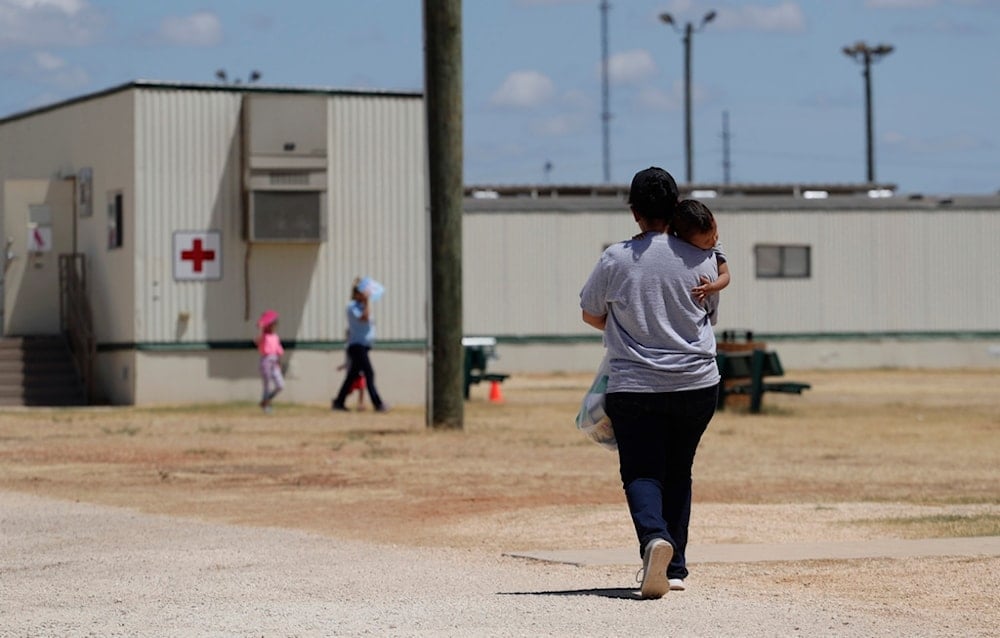Supreme Court clears fast-track deportations to random third countries
A recent Supreme Court ruling has enabled US immigration authorities to deport individuals to third countries with little to no warning or legal recourse, even when those countries offer no guarantees of safety, prompting widespread concern from legal and human rights groups.
-

Immigrants seeking asylum walk at the ICE South Texas Family Residential Center on August 23, 2019, in Dilley, Texas. (AP Photo/Eric Gay, File)
The Washington Post revealed on Monday that US immigration officials have been given broad authority to deport individuals to third countries, even if those nations have not guaranteed protection against persecution or torture. This new enforcement posture follows a recent Supreme Court ruling that overturned lower court protections, allowing such removals to proceed with little to no procedural safeguards.
In a memo distributed last week to Immigration and Customs Enforcement (ICE) staff, Acting Director Todd M. Lyons authorized deportations to "alternative" countries to begin immediately. Under the new policy, immigrants could be removed with just 24 hours' notice, and in "exigent circumstances," in as little as six hours. For countries that have provided diplomatic assurances of safety, individuals may be deported without any prior notice at all.
"If the State Department 'believes those assurances to be credible,' then ICE may deport someone to that country without the need for further procedures," Lyons wrote in the memo obtained by The Washington Post.
Perilous removals
Legal experts and human rights advocates have voiced deep concern over the move, warning that thousands of immigrants, many with long-standing ties to the US, now face removal to countries where they have no family, community, or even linguistic familiarity.
Trina Realmuto, executive director of the National Immigration Litigation Alliance, said the policy presents a clear danger. "It puts thousands of lives at risk of persecution and torture," she said, citing the case of a Guatemalan man who was deported to Mexico and subsequently kidnapped and raped.
The Supreme Court's unsigned June 23 ruling set aside an earlier decision by US District Judge Brian Murphy, who had barred the government from deporting immigrants without granting them a "meaningful" opportunity to challenge their removal. That included access to legal counsel and time to prepare a defense. The Court's conservative majority vacated those protections without explanation, prompting Justice Sonia Sotomayor's sharp dissent: "In matters of life and death, it is best to proceed with caution," she wrote. "In this case, the Government took the opposite approach."
The controversy has only deepened with recent revelations involving the deportation of eight immigrants to South Sudan, a country wracked by conflict and instability. The individuals, who hailed from Cuba, Laos, Mexico, Myanmar, Vietnam, and Sudan, were removed after the Supreme Court lifted a legal barrier to their transfer.
According to court documents, none of them were South Sudanese nationals, and legal advocates decried the act as a dangerous precedent for third-country removals. The document added that the individuals had no connection to South Sudan and were at severe risk of harm, while advocacy groups argue this case exemplifies the policy's disregard for basic due process and international norms.
Rushed deportation crisis
Simon Sandoval-Moshenberg, lead counsel in a separate federal lawsuit, said the Lyons memo reflects an approach that is "clearly inadequate" to ensure safety. "It is definitely thousands upon thousands of people," he said, adding that many immigrants thought they were safe from deportation after prior legal rulings.
Homeland Security Secretary Kristi L. Noem defended the move, arguing on Fox News Sunday that the policy is rooted in prior procedures and supported by State Department negotiations. "Many times, if other countries aren't receiving their own citizens, other countries have agreed that they would take them in … and take care of them until their home country would receive them," she said.
Still, critics argue that such arrangements, often opaque and unmonitored, fall well short of ensuring safety. The memo's narrow timeline and vague vetting procedures have prompted concerns that many at-risk individuals will not be able to access legal help or make their case before being forcibly removed.
Read more: How ICE blocked mothers from securing custody of US citizen children
Under international law, specifically the Convention Against Torture, the United States is prohibited from sending individuals to countries where they are likely to face torture. But advocates fear the policy now sidesteps those protections through a rushed and selective process that leaves many vulnerable individuals without recourse.
As deportations to third countries resume, immigration lawyers and rights groups are bracing for more emergency filings and legal challenges in a bid to prevent further removals that may result in persecution, abuse, or death.

 4 Min Read
4 Min Read










